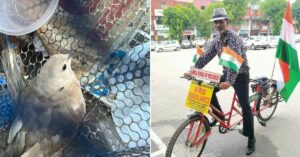How this Delhi Couple’s Love For Animals Became a Lesson For All CBSE Students
“When I see children pledge not to burst crackers so that animals can be safe or care for at least one stray dog in their vicinity or even never to take a joyride on an elephant, my heart swells with delight that we have made a difference."
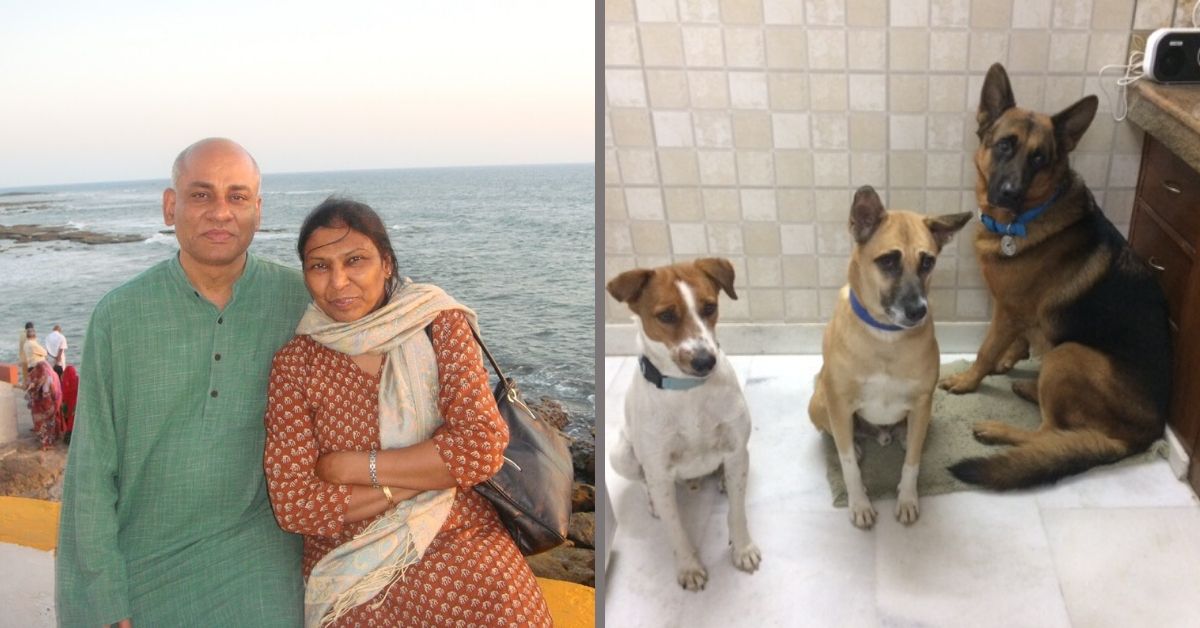
We teach Biology but do we teach children to respect animals? We teach Physics and Natural Sciences but do we teach kids to protect the planet they inhabit? Isn’t it more common to hear, ‘Stay away from the dog, it will bite’ rather than, ‘It’s hot, let’s keep a bowl of water for the passing stray animals’?
Mahatma Gandhi had once said, “The greatness of a nation and its moral progress can be judged by the way in which its animals are treated.”
Delhi-based animal welfare organisation ‘Stray Relief and Animal Welfare’ (STRAW), had tied up with CBSE and other State Education Boards, as part of the Compassionate Classrooms programme. It has been providing content to textbooks and teacher manuals on kindness towards animals. The idea was to boost the values of empathy and sensitivity towards animals specifically and the environment at large among children.
STRAW was founded by the husband-wife duo of Vasanthi and Dinesh Kumar, passionate about building a better world for voiceless creatures. Dinesh grew up with pets such as dogs, cats, parrots and rabbits for company. Vasanthi, on the other hand, was wary of animals in her childhood and pursued a corporate career in PR; she gave it all up to start STRAW. Today, she is a proud humane educator!
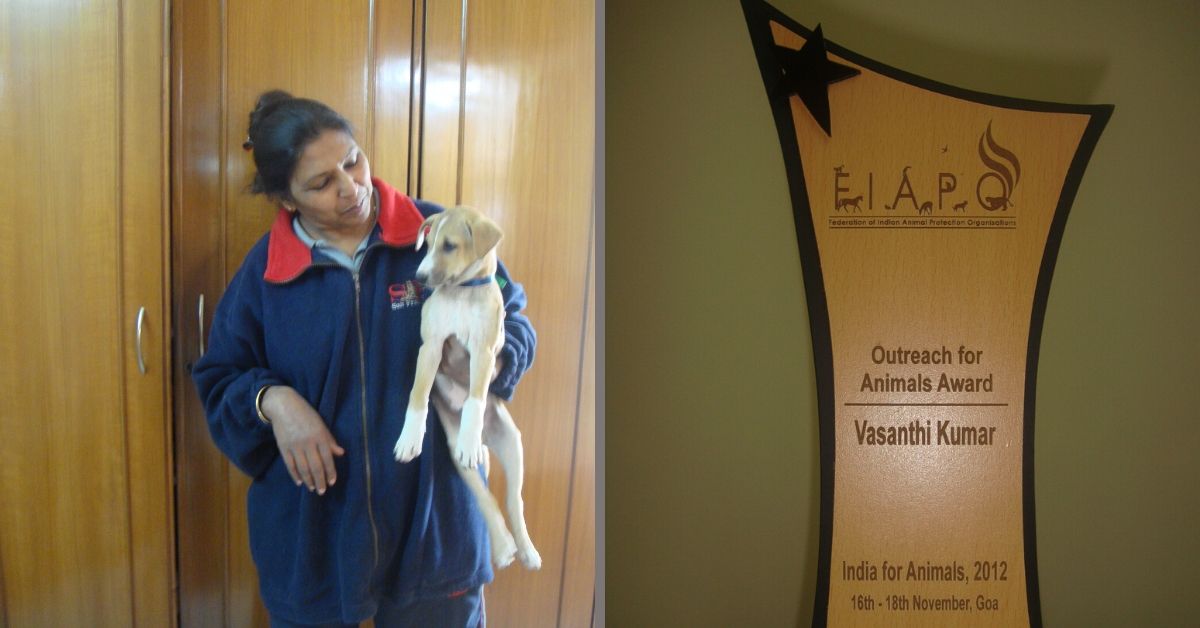
Speaking about how STRAW started, Vasanthi says, “STRAW and animal welfare are my second career. At the very beginning, the desire was to do everything, including an animal shelter, veterinary services, and education. But soon, we realised that all animal welfare problems emerge from one cause, i.e. the lack of awareness of what the voiceless animals go through in their day-to-day lives.”
In 2017, as per a report in Hindustan Times, 19,028 animal cruelty cases were recorded over five years in Mumbai without any arrests. This data was compiled by Bombay Society for Prevention of Cruelty to Animals. The cases included merciless and sadistic beating up, torturing and killing of animals such as dogs, cats, horses, bullock, cattle, fowl, birds and so on.
According to the Prevention of Cruelty to Animals Act, a measly fine of Rs 10-100 is imposed on perpetrators of various animal offences, including abandoning an animal in painful conditions or leaving it to starve, or killing/poisoning/maiming/torturing an animal with imprisonment as lenient as three months or none. Clearly, the laws weren’t stringent enough to ensure care towards animals.
Appealing to the natural sensitivities of humans, awakening their feelings and empathy for animals was the need of the hour. And that sensitivity could only be brought about if the seeds of compassion were directly sown in childhood when the mind and heart were at its purest. This realisation helped Vasanthi initiate and delve into humane education, which teaches and nurtures compassion and respect for all living beings and the environment.
In fact, Vasanthi conducted her very first humane education session in her son’s classroom in 2008. The Compassionate Classrooms project was the natural outcome.
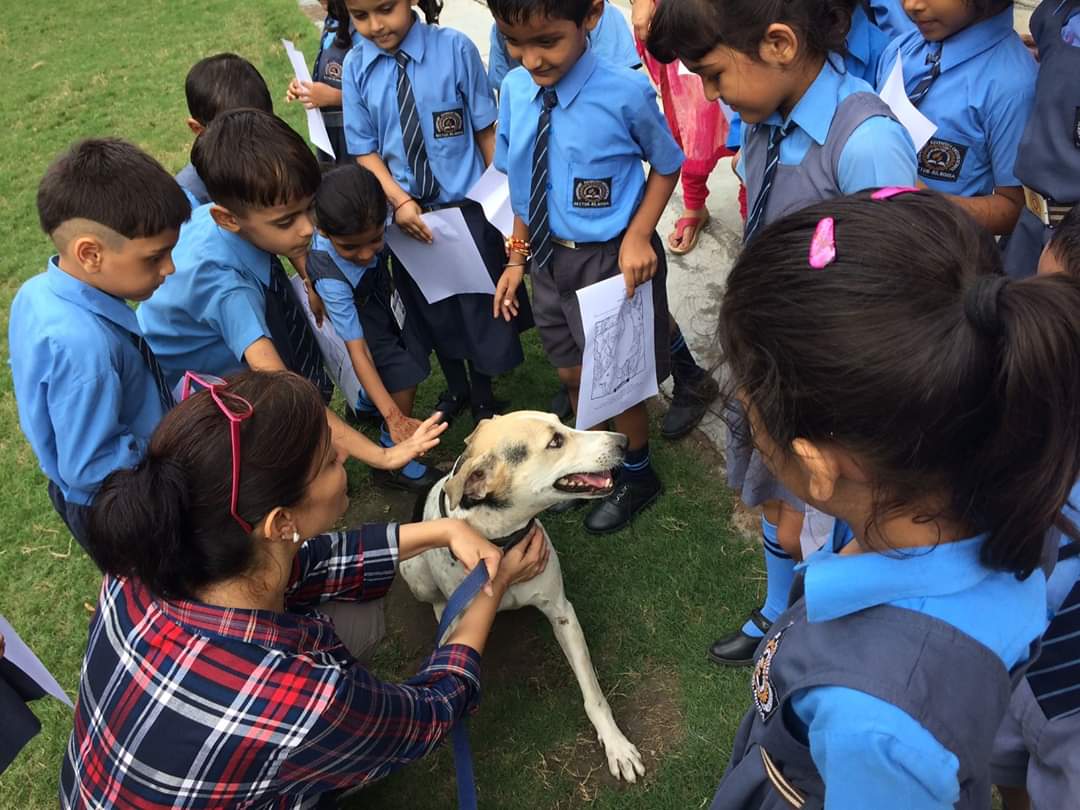
Conducting a Humane Education session involved going from one school and classroom to another. But knocking on a door did not necessarily imply that it was going to be opened. The schools had to complete their syllabi within tight deadlines. Would they really have the time and motivation to pursue something additional like humane education?
Vasanthi recalls, “Getting permission and time from schools to conduct a humane education session comes only after plenty of effort through repeated emails, phone calls and personal visits. But once in, everybody, including the students, teachers, and the school authorities, love our programmes and workshops and request us to conduct these for other classes as well.”
This meant it would take a very long time to cover the huge population of school children in our country. Vasanthi thought, “What if the contents for these lessons could become a part of school text books in order to get a faster pan-India cover?” Thus, she approached the Central Board of Secondary Education (CBSE), which had introduced the Life Skills Programme as part of the curriculum for class IX. At the same time, the Board was working on the Teacher’s Manual on Life Skills for Classes IX and X.
After a few meetings and discussions, the CBSE authorities were satisfied with the idea of Humane Education. They gave STRAW the opportunity to contribute a chapter on Empathy, which is one of the core life skills laid down by WHO.
In the next few months, the Board decided to extend its CCE (Continuous and Comprehensive Evaluation) system to classes six, seven and eight. With this, the focus on the co-scholastic skills of students had become an integral part of the evaluation system. They had also decided to publish a Teacher’s Manual – Life Skills for classes six, seven and eight. STRAW was once again called in to become a part of the panel that worked on the content for these manuals.
Naturally, the chosen topic was ‘Empathy’. With this, STRAW was contributing a total of eighteen chapters, i.e. six chapters each for classes six, seven and eight.
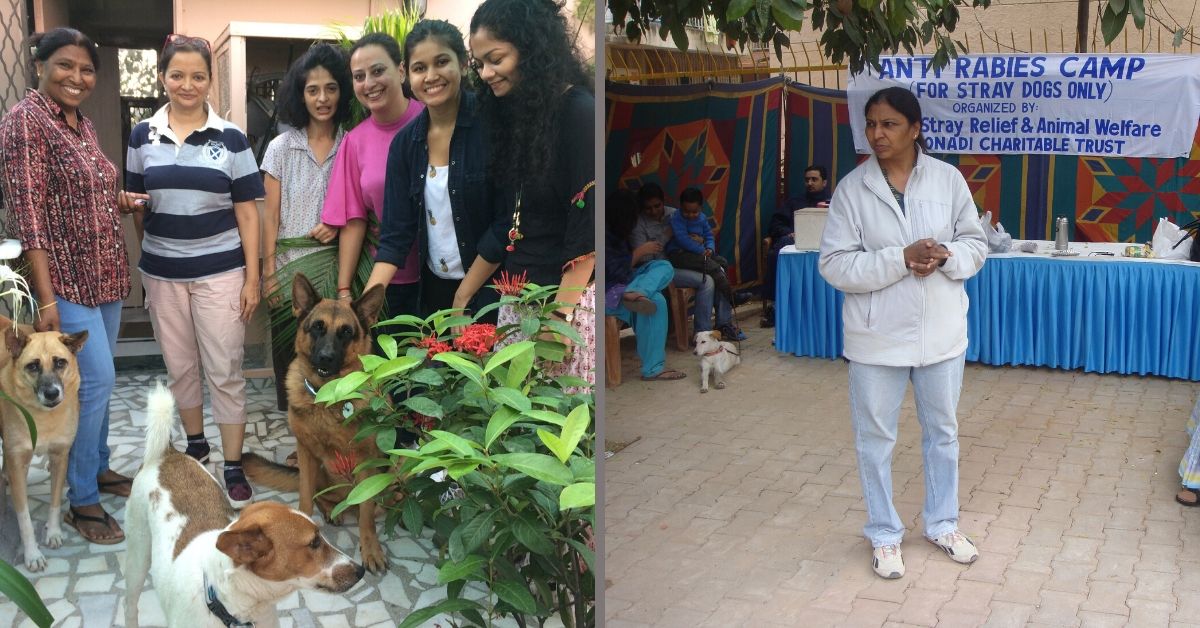
One of the chapters for class VIII was titled ‘Choosing to Help Others’. Through this lesson, the students were taught to understand the importance of helping others, both humans and animals, and to make compassionate and responsible choices towards other beings. The methodology was to divide the class into groups, which discussed different sample situations; then, students had to write out or draw their points on a chart and present it to the class. The life skills learnt were empathy, self-awareness and interpersonal relationships.
And so began the significant chapter of STRAW, the Compassionate Classroom Programme.
Beyond CBSE, STRAW contributed content to a few textbooks published by The Department of State Educational Research and Training (DSERT), Karnataka, and State Council of Educational Research and Training (SCERT), Delhi.
To date, the organisation continues to pursue the ‘Compassionate Classroom’ journey with other state education boards as well.
‘Compassionate Kids’ and ‘Compassionate Scholars’ are the two other programmes pursued by STRAW. While the former is conducted for children in schools, community libraries and informal study centers for the under-privileged, the latter is for college students. CRPF School, Delhi World Public School, DAV School, Ryan International School, and Army Public School, The Community Library Project, Deepalaya Library, are some institutions in the National Capital Region where the programme has already been conducted. Recently, STRAW conducted a few programmes in village schools of Haryana as well.
Vasanthi recalls one of the sessions that struck a chord with her. She says, “During one of our workshops, we had taken two puppies to a classroom (class V) so that children could feel and touch them to get over the fear of dogs/animals. Students were so charmed with the puppies that I received a call from the class teacher the next day asking if one of the puppies could be adopted.”
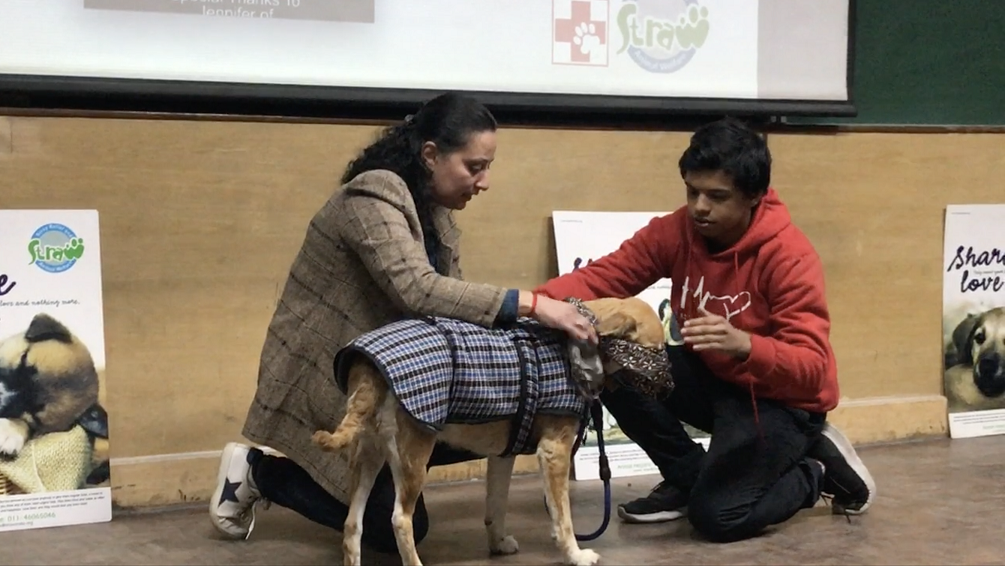
The ‘Compassionate Scholars’ Programme for college students aims to create awareness about animal welfare issues among them. This would be done through screening of documentaries, presentations and panel discussions. These sessions are done in association with the National Service Scheme (NSS) of the respective colleges.
“We have been able to sensitise about 100-150 students per session, and have been associated with NSS-IIT Delhi for the last four years. Other colleges where we have conducted sessions include Shri Ram College of Commerce, Maitreyi College, and Jawaharlal Nehru University,” says Vasanthi.
Some of the animal welfare topics that they covered included Caring for Animals on the Campus, and First Aid with live demos for animals on the Campus, How to Avoid Dog Bites, documentary screenings about problems faced by the joy ride elephants, temple elephants followed by discussions and activities relating to adverse impacts of plastic bags on animals.
Following the sessions, a committed group of students in each college took care of animals (including dogs, cats and birds) on the campuses. Their caregiving activities included feeding, vaccinations, sterilisations and other medical attention. Also, at least 100 students who were scared of dogs at one time could get over their fear and support the group who helped with animals on the campus.
Further, about 1,000 college students pledged never to take joy rides on elephants and to talk to priests about the plight of temple elephants.
The sessions were primarily in Delhi and the NCR, including Noida and Gurugram. Vasanthi adds, “We would love to spread our wings to other regions and are working in this regard. Those who love animals and children and would like to teach can get in touch with us to carry out our sessions in their own neighborhoods.”
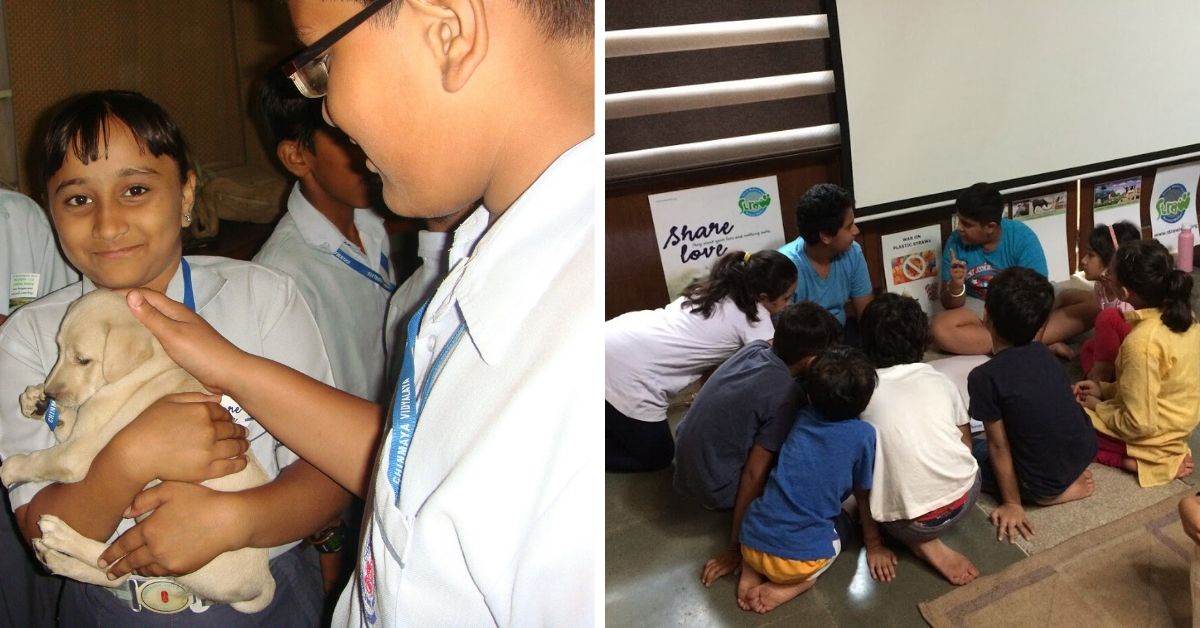
Meanwhile, through the Compassionate Classrooms Programme, STRAW contributes content relating to empathy for animals and people to school textbooks. Compassionate Kids and Compassionate Scholars are the two one-on-one programmes that come under the larger umbrella of the Compassionate Classrooms Program.
Vasanthi explains, “We have about 6-10 humane education volunteers/teachers who are associated with us in a virtual way, i.e. they conduct humane education programmes in schools in their own neighborhoods. We meet up once in three months to take stock of the work and discuss other related matters.”
Preeti Singh, a corporate professional as well as an active community animal caregiver has been associated with STRAW as a volunteer for more than two years. It was her concern and interest in humane and environment education that attracted her to STRAW. She has been developing and conducting humane education programmes for schools, colleges and universities and also helping out plan new initiatives and activities to increase engagement.
She recalls a special memory from a community library session where the children were indifferent towards community animals, “After three sessions, I saw a change of heart and students started sharing stories of saving animals, and felt sorry for pelting stones at them in the past. This incident still brings a smile to my face.”
However, with freelance trainer, Yogita Gupta, it was a personal loss that nudged her to join STRAW as a volunteer in June 2018. Her three doggy children had just passed away, leaving her depressed. When she heard about STRAW through Preeti, it was like a dream had come true for her. Right from meeting the principals of various schools to seeking permission to conducting the workshops, it was all a great experience. Sharing one of her most beautiful memories, she says, “I was able to take my Junior to Seventh Day Adventist school. The way the children reacted to him was beautiful.”
While the impact was beautiful and noteworthy, it was fraught with challenges. Funding was one, as these workshops were conducted for free to reach maximum children. Vasanthi points out, “Funding for animal care could be the last cause on the list for those who are willing to be charitable. When it comes to giving funds for the treatment, sterilisation, or feeding, it may be easy; but that’s not the case when it comes to teaching children to be kind to animals. Hence funds for most of our work comes from our earnings.”
STRAW is a non-profit organisation, recognised by the Animal Welfare Board of India. It also has Section 80G certification under the Income Tax Act. Most of the work is carried out through volunteers and some funding from the founders’ own earnings. STRAW has recently introduced a payment gateway as part of their website through which a small amount of donations have started trickling in.
Then, like a miracle, their work was noticed and rewarded by The Pollination Project (TPP), a US-based organisation that funds seed grants to social change projects that promote compassion. In March 2013, TPP gave them STRAW a micro-grant of USD 1,000 to support the Compassionate Classroom project. That was a big boost for the classroom initiative at the state board level in particular. And the first of the state boards that were targeted was Karnataka. The Pollination Project funding was used to support curriculum creation of humane education content, translation into the local language, and travel to meetings with state board members, with up to 10, 000 classrooms in the state getting impacted.
At the same time, contributing content to school textbooks despite its magnified reach was no smooth sail either. Dealing with authorities was the toughest part. “Getting appointments to finally meet them can be a Herculean task. For example, one is not sure about meeting the right person even after having travelled to another city with a definite appointment. Even phone calls and emails hardly work. It’s a similar situation with schools, which do not answer emails. They need 3-4 personal visits for a programme to firm up,” says Vasanthi.
The win-win situation is when the principal or the teacher-in-charge of the activities is a person who loves animals. In February 2020, STRAW organised an awareness and sensitisation session on the plight of stray and helpless dogs for middle school at Delhi World Public School in Greater Noida. Raina Krishnatray, the School Principal recalls, “Ms Preeti and Ms Vasanthi drove down the virtues of empathy and compassion in a child-friendly way and provoked children to think about the strays, to be kind to them, to feed them whenever possible. The children loved sharing their experiences with the stray dogs and attentively listened to the dos-and-don’ts while interacting with them.”
Also Read: Mumbai Lady Turns Farm Into a Safe Haven for 300 Injured, Abandoned Animals!
At the end of the day, despite the hardships and speed breakers, Vasanthi is satisfied by the positive change she’s bringing about through her programmes. Her ultimate goal is to take the ‘Compassionate Classrooms’ to all 35 states of India.
She concludes, “When I wear the hat of a humane educator and see children pledge not to burst crackers so that animals can be safe or care for at least one stray dog in their vicinity or even never to take a joyride on an elephant, my heart swells with delight that we have made a difference to a few animals. The goal is to sensitise each child in India so that they grow up to be kind and compassionate citizens. They should be able to care for the strays so that there is no need for shelter homes at all.”
If you love animals and enjoy working with children, you too can be a part of the Compassionate Classroom project from any city or state by starting Humane Education classes in a school in your neighbourhood. Simply write to [email protected] with ‘Humane Education Counsellor’ in the subject line. You can also write to the same email id if you wish to support STRAW/Compassionate Classroom project as a volunteer. Or if you wish to donate, you may click on this link.
(Written by Ipsita Sarkar and Edited by Shruti Singhal)
Like this story? Or have something to share?
Write to us: [email protected]
Connect with us on Facebook and Twitter.
If you found our stories insightful, informative, or even just enjoyable, we invite you to consider making a voluntary payment to support the work we do at The Better India. Your contribution helps us continue producing quality content that educates, inspires, and drives positive change.
Choose one of the payment options below for your contribution-
By paying for the stories you value, you directly contribute to sustaining our efforts focused on making a difference in the world. Together, let's ensure that impactful stories continue to be told and shared, enriching lives and communities alike.
Thank you for your support. Here are some frequently asked questions you might find helpful to know why you are contributing?


This story made me
-
97
-
121
-
89
-
167




